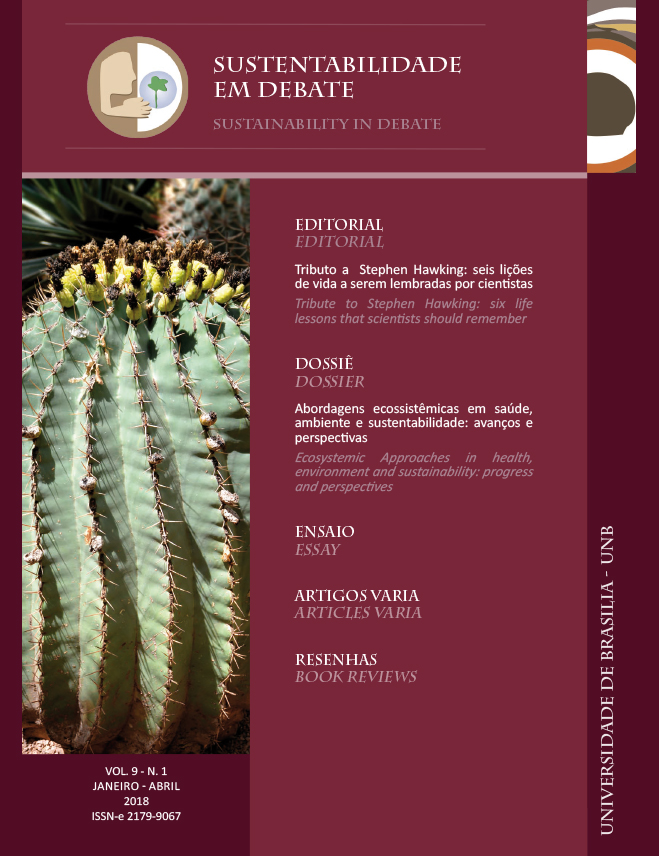Facades thermal insulation:
decrease of energetic consumption of buildings on Bioclimatic Zone 2
DOI:
https://doi.org/10.18472/SustDeb.v9n1.2018.25652Keywords:
Thermal Insulation, Energy Efficiency, Etics, Thermal ComfortAbstract
Currently the world energy and environmental scenario is in a critical state, with increasing energy demand. Its generation still depends on exhaustible and polluting natural resources. The high electric consumption directed to the artificial climatization is the main target of the study. The purpose of this paper is to analyze the thermal insulation of the building, External Thermal Insulation Composite System (Etics), against the hot climate of the Bioclimatic Zone 2 region in the analyzed period, through normative calculations and temperature measurements in prototypes executed in masonry, in the city of Lajeado, RS, Brazil. As a result, it was obtained a reduction of 81% in the thermal transmittance (U), and 68% of the energy consumption of the prototype with Etics, which considerably interfered in the design of air conditioners. The system efficiency was evident when the internal temperature comparative graphs were analyzed, with the Etics prototype exhibiting more mild and stable temperatures, compared to the external environment and to the non-insulated prototype. The analyses demonstrate a considerably positive intervention of the Etics in the thermal performance, for Bioclimatic Zone 2.
Downloads
References
ASCENSO, R. Nearly zero energy buildings - O que vai mudar com os NZEB? Edifícios e Energia. Algés, Portugal. 2016. Dsiponível em: <http://www.edificioseenergia.pt/pt/a-revista/artigo/tema-de-capa-1>. Acesso em: 20 out. 2016.
ASSOCIAÇÃO BRASILEIRA DE NORMAS TÉCNICAS NBR 15220 ”“ Desempenho Térmico de Edificações. Rio de Janeiro, 2005.
ASSOCIAÇÃO BRASILEIRA DE NORMAS TÉCNICAS NBR 15575 ”“ Edifícios habitacionais - Desempenho ”“ Parte 1. Rio de Janeiro, 2013.
ASSOCIAÇÃO BRASILEIRA DE NORMAS TÉCNICAS NBR 16401 ”“ Instalações de ar-condicionado ”“ Sistemas centrais e unitários ”“ Parte 1. Rio de Janeiro, 2008.
ASSOCIAÇÃO BRASILEIRA DE POLIESTIRENO EXPANDIDO (ABRAPEX). Manual de utilização EPS na construção civil. São Paulo, 2006.
ASSOCIAÇÃO IBÉRICA DE XPS (AIPEX). Soluções de Isolamento Térmico com Poliestireno Extrudido (XPS) para uma construção sustentável.
ASSOCIAÇÃO PORTUGUESA DOS FABRICANTES DE ARGAMASSAS E ETICS (APFAC). Laboratório de Física das Construções (LFC). Relatório - LFC-IC-282A-2014: patologias de sistemas de isolamento térmico pelo exterior tipo ETICS. Porto, Portugal, 2014.
BRASIL. Ministério de Minas e Energia. Balanço Energético Nacional ”“ BEN 2014. Relatório Final. Brasília, 2014.
CARLO, J. C. Desenvolvimento de Metodologia de Avaliação da Eficiência Energética do Envoltório de Edificações não residenciais. Tese do Programa de Pós-Graduação em Engenharia Civil, UFSC. Florianópolis, 2008.
CHAIBEN, C. A. P. B. Sistema de isolamento térmico de fachadas pelo exterior
(Etics): avaliação preliminar de viabilidade para sua aplicação no Brasil. 2014.
Monografia (Especialização em Construções Sustentáveis) ”“ Universidade Tecnológica
Federal do Paraná. Curitiba, 2014.
CHEMIN, B. F. Manual da Univates para trabalhos acadêmicos: planejamento, elaboração e apresentação. 3. ed., Lajeado: Univates, 2015.
COSTA, E. C. Física aplicada à construção civil: conforto térmico. 4º ed., São Paulo, 2003.
CREDER, H. Instalações de Ar-Condicionado. 6. ed., Rio de Janeiro, 2010.
ELETROBRAS; PROCEL. Avaliação dos Resultados do Procel 2007. Rio de Janeiro, 2008. 191 p.
EPE. Consumo mensal de energia elétrica por classe (regiões e subsistemas) ”“ 2004-2017. Brasília: Ministério de Minas e Energia, maio de 2017. Disponível em: <http://www.epe.gov.br/mercado/Paginas/Consumomensaldeenergiael%C3%A9tricaporclasse(regi%C3%B5esesubsistemas)%E2%80%932011-2012.aspx>.
FREITAS, V. P.; GONÇALVES, P. F. Isolamento térmico de fachadas: reboco delgado armado sobre poliestireno expandido. Porto, Portugal: FEUP, 2005.
FROTA, A. B.; SCHIFFER, S. R. Manual do conforto térmico. 8. ed., São Paulo, 2007.
INCROPERA, F. P. et al. Fundamentos de transferência de calor e de massa. Rio de Janeiro, 2011.
KEELER, M.; BURKE, B. Projeto de edificações sustentáveis. Porto Alegre, 2010.
LABORATÓRIO NACIONAL DE ENGENHARIA CIVIL. Documento de Homologação DH 911. Weber. Therm Classic: Sistema Compósito de Isolamento Térmico pelo Exterior, Lisboa, Portugal, 2010. Disponibilizado pelo Instituto Politécnico de Leiria. Leiria, Portugal.
LAMBERTS, R. Eficiência energética na arquitetura. 2. ed., São Paulo, 2004.
LAMBERTS, R. Conforto e Stress térmico. Laboratório de Eficiência Energética de Edificações. Florianópolis: UFSC, 2014.
LIA, L. R. B.; QUITES, E. E. C. Introdução à transferência de calor: Notas de aula, 2001.
SCHMID, A. L. A ideia de conforto: reflexões sobre o ambiente construído. Curitiba, 2005.
SCHMIDT, F. W. Introdução à s Ciências Térmicas: termodinâmica, mecânica dos fluidos e transferência de calor. São Paulo, 2004.
Downloads
Published
How to Cite
Issue
Section
License
SUSTAINABILITY IN DEBATE – Copyright Statement
The submission of original scientific work(s) by the authors, as the copyright holders of the text(s) sent to the journal, under the terms of Law 9.610/98, implies in the concession of copyrights of printed and/or digital publication to the Sustainability in Debate Journal of the article(s) approved for publication purposes, in a single issue of the journal. Furthermore, approved scientific work(s) will be released without any charge, or any kind of copyright reimbursement, through the journal’s website, for reading, printing and/or downloading of the text file, from the date of acceptance for publication purposes. Therefore, the authors, when submitting the article (s) to the journal, and gratuitous assignment of copyrights related to the submitted scientific work, are fully aware that they will not be remunerated for the publication of the article(s) in the journal.
The Sustainability in Debate Journal is licensed under Creative Commons License – Non-Commercial-No-Derivation Attribution (Derivative Work Ban) 3.0 Brazil, aiming at dissemination of scientific knowledge, as indicated on the journal's website, which allows the text to be shared, and be recognized in regards to its authorship and original publication in this journal.
Authors are allowed to sign additional contracts separately, for non-exclusive distribution of the works published in the Sustainability in Debate Journal (for example, in a book chapter), provided that it is expressed the texts were originally published in this journal. Authors are allowed and encouraged to publish and distribute their text online, following publication in Sustainability in Debate (e.g. in institutional repositories or their personal pages). The authors expressly agree to the terms of this Copyright Statement, which will be applied following the submission and publishing by this journal.








